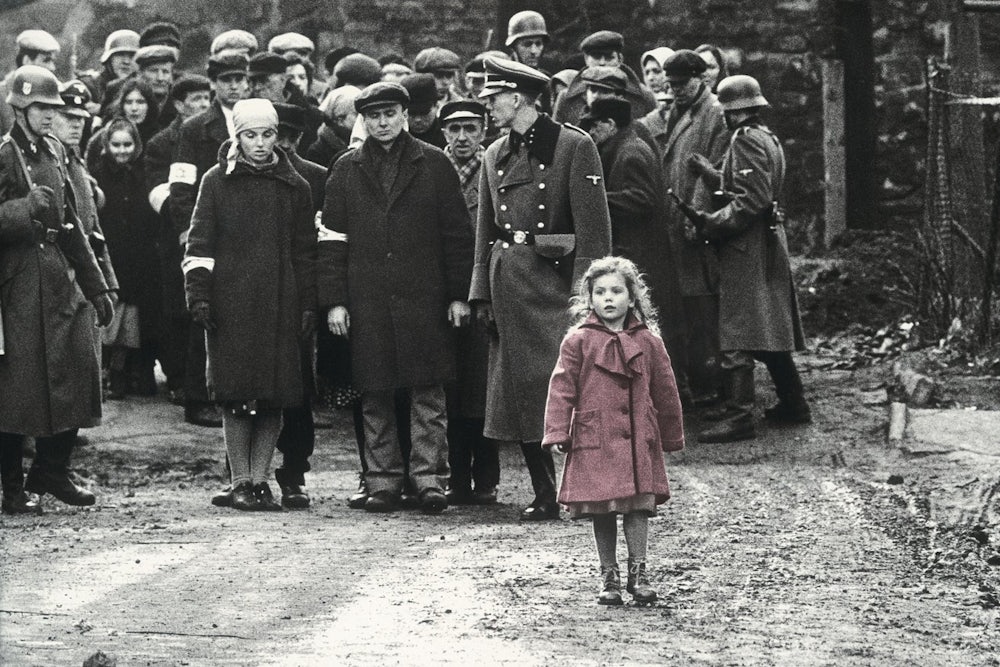Steven Spielberg has made his own Holocaust museum. In Schindler’s List (Universal), an adaptation by Steven Zaillian of Thomas Keneally’s book, Spielberg has created a 184-minute account of the fate of Kraków’s Jews under the German occupation, centered on the German businessman and bon vivant, Oskar Schindler, who devised a ruse to save 1,100 Jews from the Auschwitz ovens. A closing note tells us that in Poland today there are fewer than 4,000 Jews but in the world there are 6,000 “Schindler Jews,” survivors and descendants.
For this film Spielberg has done the best directing of his career. Much of his previous work has been clever and some of it better than that, but Schindler’s List is masterly. He has, with appropriate restraint, shot it in black and white (except for two closing sequences in color). Janusz Kaminski’s superb cinematography uses shadows like prosody—illuminates with shadows. Michael Kahn has edited with intensity and line, never breathless, always fast. (One demurral: the intercutting between a Jewish wedding in a camp, a wild German officers’ party and a German officer’s boudoir romp is heavy.) John Williams has arranged a score, with Itzhak Perlman doing violin solos, that for the most part is quiet: Jewish melodies on woodwinds or a small children’s chorus under scenes of inhumanity.
Liam Neeson plays--no, inhabits--Schindler with the authority of a round-voiced, juggernaut con man. Neeson bears himself like a Middle European, a comment I can’t quite explain but that may be understood by many. He drives forward like a sensualist whose pleasures are food, drink, women and money. And Ben Kingsley—O rare Ben Kingsley!—is the Jewish accountant whom Schindler plucks from a condemned group to run his business and who combines gratitude with disdain, subservience with pride. (Actors who want to study the basis of acting—concentration—should watch Kingsley.)
Spielberg has not used one trite shot, one cheap tear-jerking assemblage. Tears are evoked, but honorably; his aim was to make a film that gripped us with authenticity. To this end he often uses newsreel angles and newsreel cutting. Yet he is not band-held-camera nutty: where a panorama is needed--Jews in a long street assembling for deportation, Jews in a (seemingly) mile-wide file coming over a great field toward liberation--he understands how to present it and leave it alone. (Most of this picture was filmed in Poland.) Imagination, talent, commitment shine in every flame.
Now come two dreadful words: and yet. Is there a need for another film about the Holocaust? Especially after Shoah? Presumably there are at least some people who have never seen a Holocaust film and may see this one because it’s by Spielberg and will have mainstream promotion. Let’s hope there are many such.
But others may be aware of two bothersome connected points. Both of them demonstrate yet again how good work can be victimized by previous work, good or less good, on the same subject. First, the German commander, played by Ralph Fiennes, though based on fact, is by now something of a film cliché—smooth, cultivated, monstrous. Second, the film takes about two hours to reach the event that the tide promises, Schindler’s (not quite predictable) rescue operation. Everything up to then, vigorously done though it is, is—in two senses—terribly familiar.
Still, this film is a welcome astonishment from a director who has given us much boyish esprit, much ingenuity, but little seriousness. His stark, intelligent style here, perfectly controlled, suggests that this may be the start of a new period in Spielberg’s prodigious career—Part Two: The Man.
